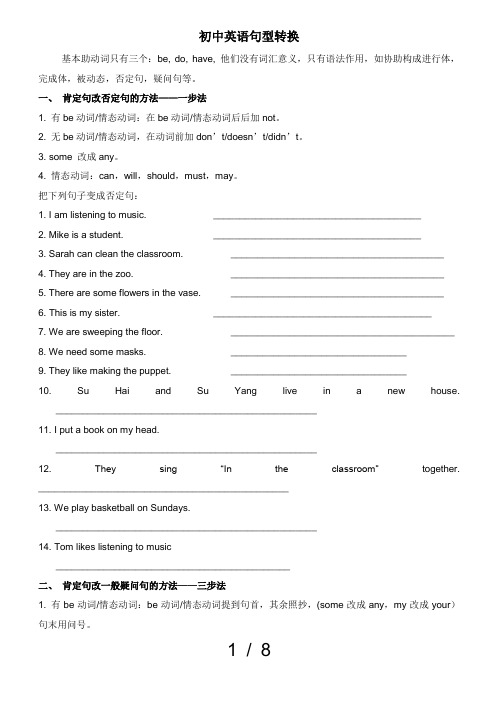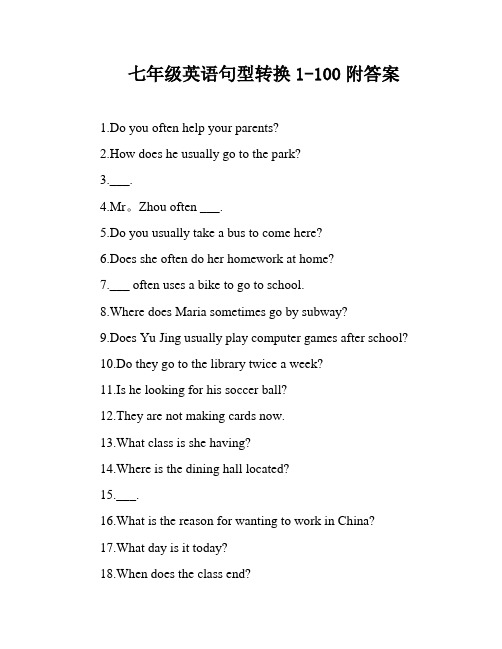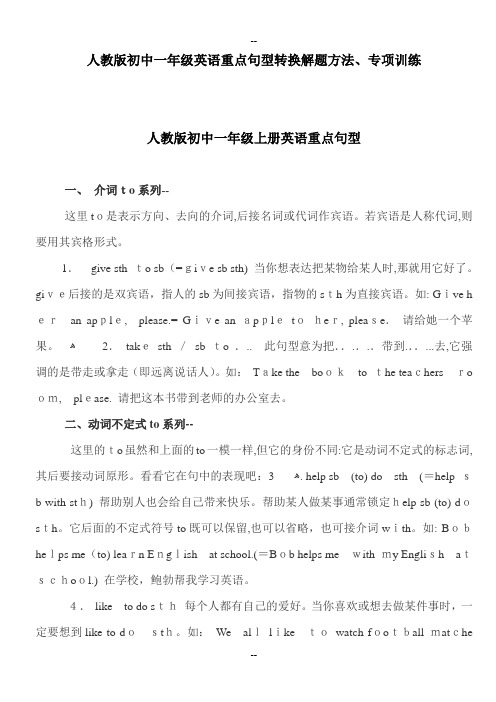初一英语句型转换[1]
初中英语七年级必备整理句型转换陈述句变一般疑问句特殊疑问句及练习

初中英语句型转换基本助动词只有三个:be, do, have, 他们没有词汇意义,只有语法作用,如协助构成进行体,完成体,被动态,否定句,疑问句等。
一、肯定句改否定句的方法——一步法1. 有be动词/情态动词:在be动词/情态动词后后加not。
2. 无be动词/情态动词,在动词前加don’t/doesn’t/didn’t。
3. some 改成any。
4. 情态动词:can,will,should,must,may。
把下列句子变成否定句:1. I am listening to music. _______________________________________2. Mike is a student. _______________________________________3. Sarah can clean the classroom. ________________________________________4. They are in the zoo. ________________________________________5. There are some flowers in the vase. ________________________________________6. This is my sister. _________________________________________7. We are sweeping the floor. __________________________________________8. We need some masks. _________________________________9. They like making the puppet. _________________________________10. Su Hai and Su Yang live in a new house._________________________________________________11. I put a book on my head._________________________________________________12. They sing “In the classroom”together. _______________________________________________13. We play basketball on Sundays._________________________________________________14. Tom likes listening to music____________________________________________二、肯定句改一般疑问句的方法——三步法1. 有be动词/情态动词:be动词/情态动词提到句首,其余照抄,(some改成any,my改成your)句末用问号。
初一英语句型转换

初一英语句型转换的专项练习练习一:肯定句变否定句1.He is a student.He is not a student.2.They like playing football.They don't like playing football.3.She can sing a song.She can't sing a song.练习二:陈述句变一般疑问句1.I am from China.Are you from China?2.He has a new bike.Does he have a new bike?3.They are watching TV.Are they watching TV?练习三:划线部分提问1.The book is on the desk. (划线部分为on the desk)Where is the book?2.He is my brother. (划线部分为my brother)Who is he?3.They are five yuan. (划线部分为five yuan)How much are they?— 1 —练习四:同义句转换1.It's time for lunch.It's time to have lunch.2.He is tall and thin.He is a tall and thin man.3.What's your name?May I know your name?以上是一些初一英语句型转换的专项练习,包括肯定句变否定句、陈述句变一般疑问句、划线部分提问和同义句转换等。
通过这些练习,你可以更好地掌握英语句型的变换规律,提高你的英语水平。
记得多做练习,多思考,相信你会越来越擅长英语句型转换的!— 2 —。
七年级英语怎样句型转换

七年级英语怎样句型转换在七年级的英语中,句型转换也是一个重要知识,那么七年级英语怎样句型转换呢?下面是店铺为你整理的七年级英语句型转换的方法,希望大家喜欢!七年级英语句型转换的方法单数句与复数句相互改写将句子改为复数句或单数句的关键是“牵一发而动全身”,要注意人称代词和物主代词的单复数的相互转化,动词的原形和第三人称单数的相互转化,名词以及量词的单复数的相互转化。
这就要求同学们对相关知识要熟练掌握。
例如:She has a tennis racket. 改成复数句为:They have some tennis rackets.。
由此能够看出主语变了,其后的动词也变了,一个网球拍变成了一些网球拍。
Those are backpacks.改成单数句为:That is a backpack.。
改为一般疑问句将陈述句改为一般疑问句分两种情况。
第一种是句子中含有be动词(常见的有am,is,are)。
这种情况只需把be动词提到句首,将句号变为问号即可。
特别注意:如果陈述句中主语是第一人称的I,那么在变为一般疑问句时将其变为第二人称,同时其所对应的be动词也要跟着改变。
例如:I am a teacher.变为一般疑问句应该为Are you a teacher?。
第二种情况是句子中不含be动词。
在这类陈述句中要借助于do 或does,do和does 的选择是根据句子主语的人称和数来定的:(1)当主语为第三人称单数形式或不可数名词的时候,用does;(2)主语为第一人称、第二人称,以及表示复数意义的词做主语时,用do。
(3)另外还可以根据陈述句中的动词是否为第三人称单数形式来判断。
例如:1) Tim has a good watch.变为一般疑问句为Does Tim have a good watch? 2) T om and Jerry like playing football 变为一般疑问句为 Do Tom and Jerry like playing basketball?一些题目要求改写句子之后做相应的回答,只要一般疑问句改写正确之后,相应的回答也就迎刃而解了。
七年级英语句型转换1-100附答案

七年级英语句型转换1-100附答案1.Do you often help your parents?2.How does he usually go to the park?3.___.4.Mr。
Zhou often ___.5.Do you usually take a bus to come here?6.Does she often do her homework at home?7.___ often uses a bike to go to school.8.Where does Maria sometimes go by subway?9.Does Yu Jing usually play computer games after school?10.Do they go to the library twice a week?11.Is he looking for his soccer ball?12.They are not making cards now.13.What class is she having?14.Where is the dining hall located?15.___.16.What is the reason for wanting to work in China?17.What day is it today?18.When does the class end?19.What subject are you currently studying?20.How many lessons do they have every day?21.There is no picture on the wall.22.What is she making?23.There are boys in the room.24.Does Tom have books?25.___.26.How many days are there in a week?27.Where are your shoes located?28.Are there any books and a pen on my desk?29.Would you like to go to school by bus?30.What is on the table near the window?31.What is in the living room?32.There are no computers in our school.33.Is your study on the first floor or the second floor?34.Where are your books?___.36.There are some old men in the room.37.There is no meat on the plate.38.Is there a map of Beijing on the wall。
七年级英语句式转换30道

七年级英语句式转换30道1. 陈述句:She is a student. 疑问句:Is she a student? 解析:陈述句中有be 动词is,变为一般疑问句时将is 提到句首,句末用问号。
2. 陈述句:They are in the classroom. 疑问句:Are they in the classroom? 解析:陈述句中有be 动词are,变为一般疑问句时将are 提到句首。
3. 陈述句:I am happy. 疑问句:Am I happy? 解析:陈述句中有be 动词am,变为一般疑问句时将am 提到句首,注意第一人称I 变为第二人称you 时,be 动词要用are。
4. 陈述句:He likes apples. 疑问句:Does he like apples? 解析:陈述句中动词likes 是第三人称单数形式,变为一般疑问句时要借助助动词does,likes 变回原形like。
5. 陈述句:We play football on Sundays. 疑问句:Do we play football on Sundays? 解析:陈述句中动词play 是原形,变为一般疑问句时借助助动词do。
6. 陈述句:The dog runs fast. 疑问句:Does the dog run fast? 解析:陈述句中动词runs 是第三人称单数形式,变为一般疑问句时借助助动词does,runs 变回原形run。
7. 陈述句:My father works hard. 疑问句:Does my father work hard? 解析:陈述句中动词works 是第三人称单数形式,变为一般疑问句时借助助动词does,works 变回原形work。
8. 陈述句:She has a pen. 疑问句:Does she have a pen? 解析:陈述句中has 是have 的第三人称单数形式,变为一般疑问句时借助助动词does,has 变回原形have。
初中英语七年级必备整理版句型转换(陈述句变一般疑问句特殊疑问句及练习)

学习必备欢迎下载初中英语句型转换一、 肯定句改的方法——一步法1. 有 be 动词(is are am were was)/情态动词(can,could, will, would, shall, should,must,may)的。
在 be 动词/情态动词后后加 not。
2. 无 be 动词/情态动词,一般现在时在动词前加 don’t 第三人称单数前 doesn't/一般过去式 didn’t。
3 加 doesn't/ did n’t 的句子注意,句子动词要变成原型。
二、 肯定句改一般疑问句的方法——三步法1. 有 be 动词/情态动词:be 动词/情态动词提到句首,其余照抄,(some 改成 any,第一人称变为第二人称 my改成 your , I 改成 you,we 改成 you,our 改成 your )句末用问号。
2. 无 be 动词/情态动词,在句首加 Do/Does/Did,其余照抄,(some 改成 any,第一人称变为第二人称 my 改成 your , I 改成 you,we 改成 you,our 改成 your )句末用问号。
3. 加 Does、did 的句子注意,句子动词要变成原型。
例如 陈述句: They are in the park.He can play the guitar.He likes the dogs.否定句 They are not in the park. He can not play the guitar. He doesn't like the dogs一般疑问句: Are they in the park?Can he play the guitar?Does he like the dogs?把下列句子变成一般疑问句和 否定句1. I am listening to music._______________________________________2 Tom likes listening to music________________________________________3. Sarah can clean the classroom.________________________________________4. I put a book on my head.________________________________________5. There were some flowers in the vase. 6. We play basketball on Sundays. 7 I go to see my parents once a month.________________________________________ __________________________________________________________________8. She needs some masks._________________________________9. They like making the puppet.______________________10.SuHai and Su Yang lived in a new house. ________________________ ____________________特殊疑问词的用法who whom what意思 谁谁什么用法 问人的身份,姓 名等 问人的身份,姓 名等(问宾语) 问人的职业或 事物是什么例句He is LiLieWho is he ?He is my brother. Who is he ?I can ask him the question.Whom can you ask the question?He is a worker. What is he?He has a book. What does he have ?学习必备欢迎下载which哪一个 问 一 定 范 围 内 The big box is mine. Which box is yours?特指的人或物 The girl at the door is Ann. Which girl isAnn?whose谁的问所属关系This is her book. Whose book is this ?This book is hers. Whose is this book?what什么颜色 问颜色(表语) My skirt is red. What color is your skirt?colorWhat几点问点时间We play games at five in the afternoon ?timeWhat time do you play games?when什么时候 问时间We play games in the afternoon ?When do you play games?where什么地方 问地点(状语) We play games at home on Sunday ?Where do you play games on Sunday?why为什么 问原因He isn't at school today because he is ill.Why isn't he at school today ?how怎样问健康状况、 He is fine/strong. How is he ?做事的方式等 I go home by bike. How do you gohome?how old 多大几岁 问年龄He is ten. How old is he ?how多少跟复数名词, There are thirty boys in my class.many问数量How many boys are there in your class?how多少跟不可数名词 There is some milk in the bottle.much问数量或价钱 How much milk is there in the bottle?how far 多远问路程It's five kilometers away from here?How far is it from here?how soon 多久问 in+一段时间 He can finish it in half an hour.How soon can he finish it ?how long 多久问一段时间, He has lived here for a year.问物体的长短 How long has he lived here?The desk is one meters long.How long is the desk ?how often 多久问频率I go to see my parents once a month.(一次)How often do you go to see your parents?How 的疑问句辨析一、how many 和 how much 的区别how many 用来询问可数名词的数量,它的句式是:How many+复数名词+一般疑问句+?how much 用来询问不可数名词的数量,也可询问价格。
初一英语句型转换大全

初一英语句型转换大全Title: Junior High English Sentence Transformation Guide.Introduction.Sentence transformation in English is an essentialskill that helps students enhance their language proficiency and creativity. It involves converting a given sentence into another form without changing its original meaning. This guide covers various sentence transformation techniques suitable for junior high students, providing examples and explanations to aid understanding.1. Active Voice to Passive Voice.Active Voice: John wrote a book.Passive Voice: A book was written by John.Explanation: In the active voice, the subject performs the action, while in the passive voice, the action is performed on the subject.2. Simple Sentence to Compound Sentence.Simple Sentence: She is smart. She studies hard.Compound Sentence: She is smart and studies hard.Explanation: A simple sentence has one subject and one predicate. A compound sentence combines two or more simple sentences using coordinating conjunctions.3. Direct Speech to Indirect Speech.Direct Speech: "I am coming," he said.Indirect Speech: He said that he was coming.Explanation: Direct speech is when someone speaks directly to the listener, while indirect speech reportswhat someone said without using quotation marks.4. Affirmative Sentence to Negative Sentence.Affirmative Sentence: She is a doctor.Negative Sentence: She is not a doctor.Explanation: An affirmative sentence asserts a fact, while a negative sentence denies it.5. Declarative Sentence to Interrogative Sentence.Declarative Sentence: He is a teacher.Interrogative Sentence: Is he a teacher?Explanation: A declarative sentence makes a statement, while an interrogative sentence asks a question.6. Transformation of Simple Present Tense to Simple Past Tense.Simple Present Tense: She watches TV every day.Simple Past Tense: She watched TV every day.Explanation: The simple present tense is used for actions that occur regularly or habits, while the simple past tense is used for actions that occurred in the past.7. Transformation of Simple Future Tense to Future Perfect Tense.Simple Future Tense: I will visit my grandparents next week.Future Perfect Tense: I will have visited my grandparents by next week.Explanation: The simple future tense expresses actions in the future, while the future perfect tense expresses actions that will be completed in the future.8. Transformation of Simple Present Tense to Present Continuous Tense.Simple Present Tense: She studies hard.Present Continuous Tense: She is studying hard.Explanation: The simple present tense is used for general truths or habits, while the present continuous tense is used for actions that are currently happening.Conclusion.Sentence transformation is a crucial skill in English language learning. Junior high students can enhance their language proficiency by practicing and applying these transformation techniques. With regular practice, they will be able to create more varied and interesting sentences, improving their communication skills.。
初一英语句型转换

初一英语句型转换专项——句型转换一、含有be动词的陈述句变一般疑问句和否定句1.Is the student at school?2.Are the students at school?3.Is his father not an English ___?4.Are these cats not crying?5.Is he not crying under the tree?6.Is ___ November?7.Are Mrs。
Li and Kitty in a big shop?8.Is everybody not in the classroom?9.Is the boy under the tree not hungry?10.Is your brother's aunt not on the chair?11.Is there not an eraser on the desk?12.Are those not your keys?13.Is John not his first name?14.Is my father not fine?15.Is this not a short?16.Are there not two pens in the pencil case?17.Are the boys not my good friends?二、不含be动词(即含行为动词)的陈述句变一般疑问句和否定句1.Can they not swim?2.Do you not like to read English?3.Do you not go to school on foot?4.Does he not like English?5.Does his father not go to work by bus?6.Does he not go to school every day?7.Do you not want to have a model car?8.Does she not want a cup of coffee?9.Do Mrs。
人教版初一英语句型转换解题方法、专项训练

人教版初中一年级英语重点句型转换解题方法、专项训练人教版初中一年级上册英语重点句型一、介词to系列--这里to是表示方向、去向的介词,后接名词或代词作宾语。
若宾语是人称代词,则要用其宾格形式。
1.give sth to sb(=give sb sth) 当你想表达把某物给某人时,那就用它好了。
give后接的是双宾语,指人的sb为间接宾语,指物的sth为直接宾语。
如: Give h eran apple,please.= Give an appletoher, please.请给她一个苹果。
ﻫ2.takesth /sb to ...此句型意为把......带到......去,它强调的是带走或拿走(即远离说话人)。
如:Take the bookto the teachersro om,please. 请把这本书带到老师的办公室去。
二、动词不定式to系列--这里的to虽然和上面的to一模一样,但它的身份不同:它是动词不定式的标志词,3. help sb(to) do sth(=help s其后要接动词原形。
看看它在句中的表现吧:ﻫb with sth) 帮助别人也会给自己带来快乐。
帮助某人做某事通常锁定help sb (to) dosth。
它后面的不定式符号to既可以保留,也可以省略,也可接介词with。
如: Bobhelps me(to) learn English at school.(=Bob helps mewith my English atschool.) 在学校,鲍勃帮我学习英语。
4.like to do sth每个人都有自己的爱好。
当你喜欢或想去做某件事时,一定要想到like to dosth。
如:We allliketowatch football matche5. ask sb todo sth此句意为请某人去做某事。
s. 我们都喜欢看足球比赛。
ﻫ句中的todo sth是指宾语sb所发出的动作,而不是指主语的动作。
七年级英语句型转换题

七年级英语句型转换题英语句型转换是提高语言运用能力和理解能力的重要训练方法之一。
在七年级的英语学习中,句型转换可以帮助学生更好地掌握英语语法规则,提高句子的表达能力,增加对不同语言结构的理解。
下面将详细介绍一些七年级英语句型转换题。
一、陈述句与一般疑问句转换1. 陈述句:He is a student.一般疑问句:Is he a student?2. 陈述句:She plays tennis every Sunday.一般疑问句:Does she play tennis every Sunday?3. 陈述句:They have lunch at 12:00.一般疑问句:Do they have lunch at 12:00?4. 陈述句:We live in London.一般疑问句:Do we live in London?5. 陈述句:You like chocolate ice cream.一般疑问句:Do you like chocolate ice cream?二、一般疑问句与陈述句转换1. 一般疑问句:Can she swim?陈述句:She can swim.2. 一般疑问句:Have they been to Beijing?陈述句:They have been to Beijing.3. 一般疑问句:Is it raining?陈述句:It is raining.4. 一般疑问句:Did he watch TV last night?陈述句:He watched TV last night.5. 一般疑问句:Do you like pizza?陈述句:You like pizza.三、陈述句与否定句转换1. 陈述句:She is a doctor.否定句:She is not a doctor.2. 陈述句:I can swim.否定句:I cannot swim.3. 陈述句:We visit our grandparents every summer.否定句:We do not visit our grandparents every summer.4. 陈述句:He likes playing basketball.否定句:He does not like playing basketball.5. 陈述句:They have finished their homework.否定句:They have not finished their homework.四、特殊疑问句与陈述句转换1. 特殊疑问句:What is your name?陈述句:My name is Tom.2. 特殊疑问句:When did you wake up this morning?陈述句:I woke up this morning.3. 特殊疑问句:Where is the nearest supermarket?陈述句:The nearest supermarket is here.4. 特殊疑问句:How many students are there in your class?陈述句:There are 30 students in my class.5. 特殊疑问句:Why did you go to the park yesterday?陈述句:I went to the park yesterday for a picnic.通过以上的例题,可以看出七年级英语句型转换题主要包括陈述句与一般疑问句的转换、一般疑问句与陈述句的转换、陈述句与否定句的转换以及特殊疑问句与陈述句的转换等。
七年级英语句型转换练习

七年级英语句型转换练习### 七年级英语句型转换练习#### 练习一:一般疑问句转换1. 原句:I am a student.转换:Are you a student?2. 原句:She likes playing basketball.转换:Does she like playing basketball?3. 原句:They have an English class today.转换:Do they have an English class today?4. 原句:We usually go to school by bus.转换:Do you usually go to school by bus?5. 原句:He can speak English fluently.转换:Can he speak English fluently?#### 练习二:否定句转换1. 原句:I have a new book.转换:I don't have a new book.2. 原句:She watches TV every evening.转换:She doesn't watch TV every evening.3. 原句:They are at home now.转换:They aren't at home now.4. 原句:We have finished our homework.转换:We haven't finished our homework.5. 原句:He is good at math.转换:He isn't good at math.#### 练习三:特殊疑问句转换1. 原句:I am a teacher.转换:What are you?2. 原句:She is from China.转换:Where is she from?3. 原句:They are going to the park.转换:Where are they going?4. 原句:We have three classes in the morning.转换:How many classes do you have in the morning?5. 原句:He likes playing the piano.转换:What does he like doing?#### 练习四:陈述句转间接引语1. 原句:I said, "I am tired."转换:I said that I was tired.2. 原句:She said, "I will go to the library."转换:She said that she would go to the library.3. 原句:They said, "We have been to Beijing."转换:They said that they had been to Beijing.4. 原句:We said, "We will help you."转换:We said that we would help you.5. 原句:He said, "I have finished my homework."转换:He said that he had finished his homework.#### 练习五:条件状语从句转换1. 原句:If I have time, I will go to the cinema.转换:I will go to the cinema if I have time.2. 原句:She will help you unless she is busy.转换:She will help you if she isn't busy.3. 原句:They will come to the party if they are invited.转换:They will come to the party provided that they are invited.4. 原句:We will start the project as soon as we get the approval.转换:We will start the project the moment we get the approval.5. 原句:He will study abroad if he passes the exam.转换:He will study abroad provided that he passes the exam.。
初一英语句型转换陈述句变一般疑问句和否定句

初一英语句型转换陈述句变一般疑问句和否定句1 I can help you. 2 Tom’s T-shirt is five dollars. 3 I often watch TV on Sunday. 一、陈述句变一般疑问句的方法:1.对于助动词、情态动词、be动词作谓语的,动词作谓语的,把把be动词,can,shall, will, may等放在句。
如:首,(some 改成any,my改成your等),句点改成问号。
如:He's a teacher. →Is he a teacher? He c an swim. →Can he swim? He'd like to go there. →Would he like to go there? 2、含有have的一般疑问句,have译为“有”。
一般疑问句式有两种形式: 1.把have/has调到句首。
例如: 陈述句:Tommy has a computer. 一般疑问句:Has Tommy/he a computer? 2.加助动词do/does,第三人称单数用does,其他人称用do,过去式用did。
其句型例如上句可变为: 主语 + have...?例如上句可变为为:Do/Does + 主语Does Tommy have a computer? 3.对于实意动词作谓语的,动词原型借助do,三人称单数借助does,过去式借助did,加在句首,再把谓语改为动词原形,(some 改成any,my改成your等),句点改成问号。
其句型为:Do/Does/did + 主语 + 动词原形+其它如:如:I like him. →Do you like him? He likes me. →Does he like me? I liked him. →Did I like him? 注意:在把肯定句改成否定句或一般疑问句的时候,要注意句中是否有already、some、something、somebody等词,如果有也必须进行改变,already要改成yet,some、something、somebody等分别改成any、anything、anybody等。
七年级英语上册句型转换完整版

七年级英语上册句型转换Document serial number【NL89WT-NY98YT-NC8CB-NNUUT-NUT108】七年级英语上册U n i t1--6句型转换专练◆怎样将一个单数句子转换为复数句子①看主语,将句子中单数主语转变为复数。
this→thesethat→thoseI→wehe/she/it→theyeg:Thisismysister.→Thesearemysisters.She ismyteacher.→Theyaremyteachers.②看谓语,把be(amis)改成are,把has改为have,等。
eg:Iamaboy.→Weareboys.ShehasanEnglishbook.→TheyhaveEnglishbooks.③看名词,把单数名词改成相应的复数名词,把不定冠词a/an 去掉。
eg:Thisismysister.→Thesearemysisters.Itisawatch.→Theyarewatches./Theyaresomewatches.④疑问词(whatwhowhere……),介词短语(inEnglish……)不变。
eg:What′sthisinEnglish?→WhataretheseinEnglish?练习:(将下列单数句子改写成复数句子)1.Thisismyfriend.2.Thatishisparent.3.Heismyson4.Itisawatch.◆陈述句转换为一般疑问句1、把be动词放在句首,剩下的照抄,(some改成any,I改成you,my改成your等)句点改成问号。
2、把can,shall,will等放到句首,剩下的照抄,(some改成any,I改成you,my改成your等)句点改成问号。
例如:陈述句:Theyareinthepark.Hecanplaytheguitar..一般疑问句:Aretheyinthepark?Canheplaytheguitar?把下列句子变成一般疑问句1.Thsismysister.2.Mikeisastudent.3.Sarahcancleantheclassroom.4.Theyareinthezoo.◆肯定句改否定句的方法——一步法1、在be动词后加not。
初一英语句型转化

初一英语句型转化一.句子概述:句子分为陈述句(有确信的陈述句和否定的陈述句),疑问句(分为一样疑问句和专门疑问句),祈使句(表示敕令,要求,要求的句子),感叹句(我们还没学)。
e.g.(如):陈述句:确信的:He is a boy. I think he is a boy. We can see them there.否定的:He isn’t a boy. I don’t think he is a boy. .We can’t s ee them there. 把确信句转化为否定句,假如是be动词连接的就在be动词后加not.(be----be not);假如是助动词do连接的在do 后加not. (do ----do not/don’t)假如是情态动词can 连接的在can 后加not. (can----can’t/can not)例句如上所示。
祈使句:如:Please look after the twins. Don’t forget my name. 等感叹句:How nice she is! (她真是漂亮啊!)疑问句:一样疑问句(也称yes-no question):能够用yes,no 来答复;他们差不多上由be 动词,助动词do,和情态动词can引导的问句。
如:Are they your pens?/ Do you know her name?/Can I sit down?专门疑问句(也称wh-question):不克不及用yes,no 来答复,要视情形来答复问题。
一样由下列这些疑问代词来引导:what ,who, where,who ,how, how old ,which等.专门疑问句=疑问代词+一样疑问句语序+?二.归纳1.询问姓名:What +be +……name/names ?e.g. What is her name? What are their names?2.询问几班:What class +be ……in..? e.g. What class am I in..? What class is she in.. ?几年级:What grade +be ……in..? e.g What grade are you in..? What grade is Lucy in..?几排:What row + be ……in..? e.g What row are they in..?几号:What number +be ……? e.g. What number is your sister ?(差别以下两句句型转化:I’m Number Eight. -------What number are you ?My number is eight.------What is your number ?因为两句的主语不合,前者主语为I ,后者主语为my number )3.询问身份:Who +be ……? e.g Who is she? /Who am I ?4.询问年纪:How old + be ……? e.g. How old is Lily?5.询问情形,身材,程度等表示如何样,若何时:How +be ……?e.g How are you? /How is your mother?6.询问地址,处所,方位时:Where +be ……?e.g. Where is your ruler ? / Where are those students?三,句型专练1~6句转化成一样疑问句(个中前三句给出确信答复,后三句给出否定答复),7~26句为划线部分提问,27~30 句转化成否定句。
初一英语语法--句型转换(详细内容)

初一英语语法--句型转换(详细内容)初一英语语法—句型转换内容:陈述句:肯定句否定句疑问句:一般疑问句特殊疑问句一.肯定句变否定句1.句子中有be,在be后加not。
(be动词有am , is , are, was, were)1)I am a student. I am not a student.2)They are blue . They aren’t blue.3) He is Kangkang. He is n’t Kangkang .4) I was ten last year. I wasn't ten yesterday.5) He was good at English. He wasn't good at English.6) They were at home last Sunday. They weren't at home last Sunday.练习:把下列句子变为否定句1.His father is an English teacher._____________________________2.He is crying under the tree. ___________________________ __3.He was thirteen years old two years ago._______________________4.They are very lucky.______________________________________5.t the family was poor.6.My voice was too weak.2.谓语是动词原形,在动词前加don’t。
7.I have a book . I don’t have a book.8.They like Chinese . They don’t like Chinese.9.3) We come from China. We don’t come from China.3.谓语动词是第三人称单数,在动词前加doesn’t,动词用原形。
初一句型转换

初⼀句型转换初⼀句型转换句型转换改为否定句改为⼀般疑问句对划线部分提问作肯定、否定回答同义句转换/改为复数句,单数句1)改为否定句1,有be动词在be动词后+not2.有情态动词在情态动词后加not,其它照抄2,⽆be动词、情态动词找助动词do/does+not,有does把动词打回原形2)改为⼀般疑问句1,有be动词把be动词提前,其他不变2,有情态动词把情态动词提前,其它不变3,⽆be动词找助动词do/does =>提到句⾸,记得遇到does要打回原型4,遇到I、we改为you; my,our改为your 3)对划线部分提问 = 特殊疑问句=特殊词+⼀般疑问句特殊词:what(问什么) how(问怎么样)where(问地点)who(问谁)What class (问班级)what grade (问年级)how old (问年龄)What color (问颜⾊)what…look like (问长相)whose (谁的)What time(问时间)how much (问价格)how many (问多少)How much (问多少)how heavy (问多重) how often (问频率)How long (问多长)4)肯定否定回答,be动词开头,be动词结尾,助动词开头,助动词结尾练习:将下列句⼦变成否定句1. I am a teacher. I a teacher.2. We are students. We students.3. Jane is a girl. Jane a girl.4. They like English. They like Chinese5. I come from China. I come from China.6. He likes Chinese. He like Chinese.7. Maria comes from Cuba.Maria come from Cuba.8. We know Maria. We know Maria.练习:将下列句⼦变成⼀般疑问句1. I am a teacher. a teacher?2. They are students. Students?3. Jane is a girl. a girl?4. They like English. they like English?5. I come from China. you come from China?6. He likes Chinese. he Chinese?7. Maria comes from Cuba.Maria from Cuba?8.We speak Chinese. you Chinese? 练习:给下列句⼦做肯定回答或否定回答1.Are you a student?Yes, . No, .2. Do they like English?Yes, . No, .3.Is Jane a girl?Yes, . No, .4. Does Maria like China?Yes, . No, .5.Is Kangkang a student?Yes , . No , .6.Is that a girl?Yes , . No , .7.Are those telephones?Yes , . No , .8.Does Tom know Jane?Yes , . No , .9.Do they come from the U.S.A?Yes , . No , . 10.Is this an egg?Yes , . No , . 练习:划线部分提问1.My name is Nancy. your name?2.I am from China. are you from?3.I am fine . are you?4. Miss.Wang is our English teacher.is your English teacher?5.Lucy is ten years old. are you?6.He is in Class One Grade Two.is he in?7.My telephone number is 5805000. your telephone number?8.They are cars. are these ?9.This is my cap. cap is this?10.My favorite movie star is Bruce Lee. is your favorite movie star ?11.It is yellow . is it?12.She is tall. What does she ?同义句转换.1.Please give Jane the book.Please the book Jane.2. Could you please tell me your name? Could you please your name me?3. He has short hair. is short.4. I have a big nose. is big.5. You have a wide mouth.is wide.6.My English teacher is old .My English teacher is not .7. Betty is not short. Betty is .8.This is my book. This is .9.This jacket is not new. This jacket is .10.My ruler is not long. My ruler is .11.She looks like her mom.She and her mom look .12.They come from China.They China.将下列句⼦变成复数.It is a box . boxes .This is a ruler. rulers.That is an eraser. erasers.He is a student. students.This is a bus. . That is a pen.将下列句⼦变成单数。
七年级英语上册句型转换

Conversion of compound sentence patterns
03
总结词
相对从句通常包含修饰主句的附加信息,可以通过将修饰信息提取出来,将其转换为简单句,使句子结构更清晰。
详细描述
示例
原句“The cat, which is black, is sleeping on the mat.” 可以转换为“The cat is sleeping on the mat. It is black.”
将相对从句转换为简单句
Convert relative clauses to simple sentences
将状语从句转换为简单句
总结词
状语从句通常用来描述主句发生的条件、时间、地点等,可以通过将状语从句的信息提取出来,将其转换为简单句,使句子结构更清晰。
详细描述
原句“When the sun rises, the birds begin to sing.” 可以转换为“The birds begin to sing. The sun has risen.”
Convert declarative sentences to interrogative sentences
总结词
将疑问句转换为陈述句
详细描述
在疑问句中,主语和谓语的位置互换,同时使用疑问词来引导句子。例如,将疑问句“Is the cat sitting on the mat?”转换为陈述句“The cat is sitting on the mat.”
并列句
I liked to play outside, and my friends did too.(我喜欢在外面玩,我的朋友们也喜欢。)
Convert compound sentences to coordinate sentences
初一英语语法之句型转换

语法专项练习之句型转换一、肯定句改否定句的方法(一步法)1、在be动词后加not。
如:is not ,are not , am not,was not,were not;2、在can,should,will等后加not。
如:cannot,should not,will not;3、上述都没有的,在动词前加助动词否定形式don’t/doesn’t/didn’t。
4、some 改成any。
二、肯定句改一般疑问句的方法(三步法)1、把be动词放在句首,剩下的照抄,(some 改成any,my改成your等)句号改成问号。
2、把can,shall,will等放到句首,剩下的照抄,(some 改成any,my改成your 等)句号改成问号。
3、上述都没有的,在句首请助动词Do/Does/Did帮忙,动词保持原形,剩下的照抄,(some 改成any,my改成your等)句号改成问号。
三、肯定句改特殊疑问句的方法(四步法)1、在一般疑问句的基础上,句首添加一个疑问词即可,可根据划线部分确定是什么疑问词。
2、接着找be动词或can,shall,will等放在疑问词后面,若没有则请助动词do/does/did帮忙,写在疑问词后面,how many/whose除外,必须先写物品,再写be动词等。
3、划线部分去掉后剩下的內容照抄,(some 改成any,my改成your等)4、句号改成问号。
练一练:1.That is a chair. (变一般疑问句)2. That`s my teacher.(变一般疑问句)3.I`m Li Lei. (变一般疑问句)4. It is an English book.(变否定句)5.It was sunny yesterday.(变否定句)6. My mum cleans the room every day.(变否定句)7. They are looking for a bag.(对划线部分提问)8.I am mending my bike now.(对划线部分提问)9. There are twelve students over there.(对划线部分提问)10.It's ten o'clock.(对划线部分提问)。
- 1、下载文档前请自行甄别文档内容的完整性,平台不提供额外的编辑、内容补充、找答案等附加服务。
- 2、"仅部分预览"的文档,不可在线预览部分如存在完整性等问题,可反馈申请退款(可完整预览的文档不适用该条件!)。
- 3、如文档侵犯您的权益,请联系客服反馈,我们会尽快为您处理(人工客服工作时间:9:00-18:30)。
专项——句型转换一、含有be动词的陈述句变一般疑问句和否定句1 The student is at school.2 The students are at school.3 His father is an English teacher.4 These cats are crying.5 He is crying under the tree.6 His birthday is on the twentieth of November.7 Mrs. Li and Kitty are in a big shop.8 Everybody is in the classroom.9 The boy under the tree is hungry.10 Your brother’s aunt is on the chair.11 There’s an eraser on the desk.12 Those are your keys.13 John is his first name.14 My father is fine.15 This is a short.16 There’re two pens in the pencil case.17 The boys are my good friends.二、不含be动词(即含行为动词)的陈述句变一般疑问句和否定句1 They can swim.2 I like to read English.3 I go to school on foot.4 He likes English.5 His father goes to work by bus6 He goes to school every day.7 I want to have a model car.8 She wants a cup of coffee.9 Mrs. Li and Kitty watch television atnight.110 I do my homework after school.11 The boy does some housework at home.12 The children had a good time in the park.13 Jim has some story-books.14 Mr. Hunt tell us something important at the meeting.15 The old man does morning exercises every morning.16 I must finish my homework before eight o’clock.17 He often goes to the library on Sundays.18 They have a class meeting every week.19 We are going to see him tomorrow.20 The story sounds very interesting.21 I can help you.22 Tom’s T-shirt is five dollars.23 I often watch TV on Sunday.三、对划线部分进行提问——特殊疑问句1 I am fine.2 His name is John Smith.3 My last name is Brown.4 John is his first name.5 Her phone number is 929316 That is a phone.7 This is a ruler in English.8 It is a watch.9 his is a pen.10 hat’s my sister.11 They’re my aunts.12 This is his cousin.13 Her backpack is on the chair.14 His keys are in his pocket.15 My alarm clock is on the sofa.16 Her pencil is between the keys.17 I can see some books on the bookshelf.18 David’s video tape is on the table.19 He has a computer.20 Twins have some balls.21 My father likes strawberries.22 She eats fruit and hamburger for lunch.23 I like the black shoes.224 His bags are next to the desk.25 The girl in yellow is Amy.26 He is OK.27 The boy in green is my brother.28 My new short is blue.29 The yellow shirt is sixteen yuan.30 He likes green.31 These tomatoes are ¥9.32 He wants a green bag.33 He wants a green bag34 These shoes are five dollars.35 The pair of socks is blue.36 My little brother is 17 years old.37 The green socks are 6 yuan.38 His birthday is October 1st.39 I was born in 1986.40 Mary ‘s birthday is October eleventh.41 We have an Art Festival each year.42 My sister is twelve.43 We have a music Festival each year.44 We have a school trip on October 21st.45 I have twelve balls.46 I have my sweater for 35 yuan.47 He likes Chinese action movies.48 My favorite movie star is Jackis Chan.49 I want to be a Beijing Opera artist.50 His father likes documentaries.51 He wants to join the art club.52 Those girl can dance.53 The want to join the art club.54 Can you play the violin ?55 She gets home at 7:30.56 My mother often makes breakfast for mein the morning.57 I want to clean a lot about Chinabecause I love China.58 Alice takes a shower in the morning.59 She has breakfast at around seventhirty.60 He likes science because it’sinteresting.61 Mr Zhang is my math teacher62 That old man is my uncle.63 We have science on Tuesday andThursday.64 He likes history because it’sinteresting65 Because P.E.is fun, I like it.66 He usually does his homework in the3evening.1 含有be动词的陈述句将be动词的适当形式置于句首。
切记I改you,We改you,my改your, our改your,最后主谓要一致。
2 不含be动词的陈述句借助于助动词do或does(单数第三人称),并将其至于句首,最后助动词do或does后面的动词要改动词原形。
3 含有be动词的陈述句变否定句:在be动词后加not.4 不含be动词的陈述句变否定句:借助于助动词do或does,放置行为动词前,最后在主动do或does后加not.5 变特殊疑问句:(1)针对划线部分选择适当的疑问词。
(2)特殊疑问词+一般疑问句语序物品、事物等---what(什么)事情、身体情况怎么样---how(怎么样)地点---where(在哪里)人物---who(谁)什么颜色---what color什么科目---what subject什么俱乐部---what club哪个,哪些---which哪个节日---节日---what festival可数名词的数量---how many(多少)不可数名词的数量---how much(多少)年龄---how old(多大)具体的点时间---what time年份、月份、日期等非钟点性时间---when原因(because)---why(为什么)做某事---what 注:原动词位置用do填补4。
